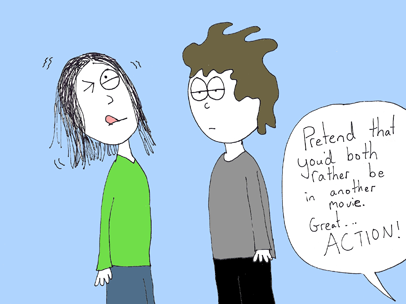In speech, sarcasm is relatively easy. There's a certain inflection used when being sarcastic, stressing words to point out how obviously untrue, and thus sarcastic, a statement is. This becomes less clear when being sarcastic with a person you don't know very well, but most people tend to shy away from sarcasm with anyone besides friends.
Sarcasm becomes more of a problem in writing, because there isn't any good way to point it out. For example, I could write the statement "I love that movie," visually stressing the word 'love' with italics, but there's no clear way of knowing if I stressed that word because I seriously do love that movie, or if I stressed that word because there was obviously no way on earth I could love that movie.
A popular web blogger I follow tried to combat this problem a few years ago, while writing his "Blogging Twilight" series. Dan Bergstein, a humorist and regular contributor to the Sparknotes blogs, was given the task to read through and comment on the entire Twilight series. He started off completely neutral, knowing only that it was an extremely popular and well-sold series that many people have grown to hate.
As a well-read person who's good and writing, however, it didn't take long for the task of reading these books to become nauseating.
 |
| One of Dan's amazing illustrations. |
To combat his frustration, Dan Bergstein had to resort to humor, which meant quite a bit of sarcasm. As I mentioned before, sarcasm is a bit difficult to write, so to solve that, Dan invented the 'Sarcasm Hand'. Whenever Dan made a sarcastic statement (like "Edward isn't a creepy stalker at all. He's the greatest guy in the world"), he would follow it by writing something to the effect of *Hand Raised* or *Raises hand*, which eventually evolved into *Sarcasm Hand*.
 'Sarcasm Hand' became a running joke on the Blogging Twilight posts, and Dan started using the phrase on his other posts as well. I have been tempted to add 'Sarcasm Hand' to a few of my blogs, but there's always been a problem with this: unless you've actually read the Blogging Twilight posts and/or follow Dan Bergstein's writings, the phrase 'Sarcasm Hand' wouldn't make sense.
'Sarcasm Hand' became a running joke on the Blogging Twilight posts, and Dan started using the phrase on his other posts as well. I have been tempted to add 'Sarcasm Hand' to a few of my blogs, but there's always been a problem with this: unless you've actually read the Blogging Twilight posts and/or follow Dan Bergstein's writings, the phrase 'Sarcasm Hand' wouldn't make sense.Dan's 'Sarcasm Hand' isn't the only way to visually identify sarcasm in text, however. A French poet at the end of the 19th century proposed what he called the pointe d'ironie (Irony Mark), a small, backwards facing question mark, to be placed at the end of an ironic or sarcastic statement. The mark is used quite a bit in France, but it never really caught on in English, mostly because pointing out irony still seems a bit unnecessary to some.
And it's true; pointing out your sarcasm is a bit unnecessary, especially if you're a skilled writer. Plus, there are many times when a writer may not care if their readers understand that they're being sarcastic.
But there are many times that a writer does care for their readers to fully understand them; like Dan, and his 'Sarcasm Hand'. For those writers, and myself, I offer the alternative '/sarc' or '/sarcasm'.
I don't know if slash commands originated on older computers, but they're used nowadays in video games, especially MMORPGs like World of Warcraft. They're ways of easily giving the computer or your character a special command, like '/help' or '/equip' or so on.
 The internet being what it is, however, slash commands have been used on many different web forums, even the ones not associated with games, as a humorous way to amend one's own text. The most popular of these is the '/sarcasm' command (often shortened to '/sarc'), used to clarify the sarcasm of my previous statement (IE, "I just love that move. /sarcasm").
The internet being what it is, however, slash commands have been used on many different web forums, even the ones not associated with games, as a humorous way to amend one's own text. The most popular of these is the '/sarcasm' command (often shortened to '/sarc'), used to clarify the sarcasm of my previous statement (IE, "I just love that move. /sarcasm").It's still a bit awkward, though less so than the backwards-interrogative Irony Mark, and much less exclusive than adding *Sarcasm Hand* to your paragraphs.
There's still the issue of whether a sarcasm indicator is even necessary, and there's no clear answer to this question. It's good to know, however, that if someone does want to indicate their sarcasm, there are multiple ways to do so, and if a sarcasm mark proves useful, then I have no doubt that in thr long run it'll see greater incorporation.

2 comments:
Finally! How did I not know that you read Blogging Twilight too?! I always want to raise my hand whenever someone says something sarcastic, but am, like you, afraid that no ones else would get it. You are now 3 times as awesome as you were before I read this post.
I'm pretty sure I started reading because you told me to, but I guess I never told you that I was. I'm also following Dan Bergstein on Facebook, which means extra awesome.
Post a Comment